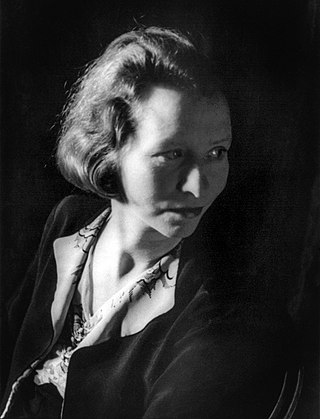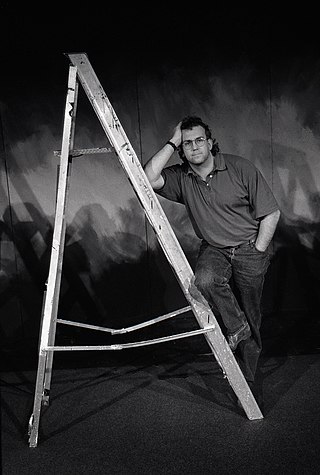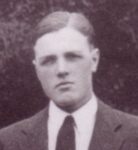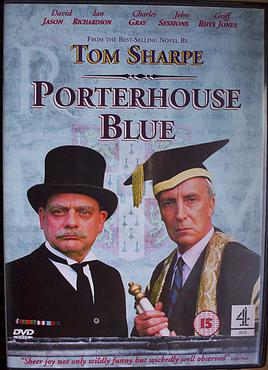
Edna St. Vincent Millay was an American lyrical poet and playwright. Millay was a renowned social figure and noted feminist in New York City during the Roaring Twenties and beyond. She wrote much of her prose and hackwork verse under the pseudonym Nancy Boyd.

Edna Ferber was an American novelist, short story writer and playwright. Her novels include the Pulitzer Prize-winning So Big (1924), Show Boat, Cimarron, Giant and Ice Palace (1958), which also received a film adaptation in 1960. She helped adapt her short story "Old Man Minick", published in 1922, into a play (Minick) and it was thrice adapted to film, in 1925 as the silent film Welcome Home, in 1932 as The Expert, and in 1939 as No Place to Go.

Porridge is a British sitcom, starring Ronnie Barker and Richard Beckinsale, written by Dick Clement and Ian La Frenais, and broadcast on BBC1 from 1974 to 1977. The programme ran for three series and two Christmas specials. A feature film of the same name based on the series was released in 1979.

John Harry Godber is an English playwright, known mainly for observational comedies. The Plays and Players Yearbook of 1993 rated him the third most performed playwright in the UK after William Shakespeare and Alan Ayckbourn. He has been creative director of the Theatre Royal Wakefield since 2011.

John Barry Humphries was an Australian comedian, actor, author and satirist. He was best known for writing and playing his stage and television characters Dame Edna Everage and Sir Les Patterson. Humphries's characters brought him international renown. He appeared in numerous stage productions, films and television shows. Originally conceived as a dowdy Moonee Ponds housewife who caricatured Australian suburban complacency and insularity, the Dame Edna Everage character developed into a satire of stardom – a gaudily dressed, acid-tongued, egomaniacal, internationally fêted "housewife gigastar".

Dame Edna Everage, often known simply as Dame Edna, is a character created and performed by late Australian comedian Barry Humphries, known for her lilac-coloured hair and cat eye glasses ; her favourite flower, the gladiolus ("gladdies"); and her boisterous greeting "Hello, Possums!" As Dame Edna, Humphries wrote several books, including an autobiography, My Gorgeous Life; appeared in several films; and hosted several television shows.

A Delicate Balance is a three-act play by Edward Albee, written in 1965 and 1966. Premiered in 1966, it won the Pulitzer Prize for Drama in 1967, the first of three he received for his work.

Richard Arthur Beckinsale was an English actor. He played Lennie Godber in the BBC sitcom Porridge and Alan Moore in the ITV sitcom Rising Damp. He is the father of actresses Samantha and Kate Beckinsale.

Hull Truck Theatre is a theatre in Kingston upon Hull, England, which presents drama productions, and also tours. In March 2022, the theatre's original premises on Coltman Street, Hull, was recognised by a blue plaque to coincide with the theatre's 50-year anniversary.

Up 'n' Under is a comedy by English playwright John Godber, first staged at the Hull Truck Theatre in 1984. It won The Laurence Olivier Award for Best New Comedy that same year. The sequel, Up 'n' Under II, followed in 1985.
"Happy Release" is an episode of the British sitcom Porridge, made for the BBC. It first aired on 21 November 1975, and is the fifth episode of the second series. In this episode, Fletcher concocts a scheme to help another prisoner get revenge on someone for cheating them of their possessions.

Dracula is a 1995 stage adaptation co-authored and by John Godber and Jane Thornton from Bram Stoker's 1897 novel of the same title. Its world premier was at the Spring Street Theatre, home of Hull Truck Theatre at Kingston upon Hull, East Riding of Yorkshire.

Meet the Browns is an American sitcom created and produced by Tyler Perry. The initial story of the show revolves around Mr. Brown running a nursing home in Decatur, Georgia, with his daughter Cora Simmons. However, as the show progresses, this idea is gradually phased out and it becomes a typical family sitcom about a multigenerational clan living under one roof. The show premiered on Wednesday, January 7, 2009, and finished its run on November 18, 2011 on TBS.

Up 'n' Under is a 1998 film adaptation of the John Godber play of the same name.
Happy families is a traditional card game.

William Thomas Godber CBE was an English authority on agriculture and agricultural engineering, an adviser to the British Government on agricultural matters, former president of the East of England Agricultural Society, former chairman of the Bedfordshire Agricultural Executive Committee and the Farmers' Club.

Porterhouse Blue is a 1987 television comedy series adapted by Malcolm Bradbury from the 1974 Tom Sharpe novel of the same name for Channel 4 in four episodes. It starred David Jason as Skullion, Ian Richardson as Sir Godber Evans, Barbara Jefford as his wife Lady Mary, Charles Gray as Sir Cathcart D'Eath, and John Sessions as Zipser. Also appearing were Griff Rhys Jones as Cornelius Carrington, Paula Jacobs as Mrs. Biggs, Bob Goody as Walter, Paul Rogers as the Dean, John Woodnutt as the Senior Tutor, Lockwood West as the Chaplain, Willoughby Goddard as Professor Siblington, Harold Innocent as the Bursar and Ian Wallace as the Praelector.

Peter Clark Godber is a Canadian professional football offensive lineman for the Saskatchewan Roughriders of the Canadian Football League (CFL).














